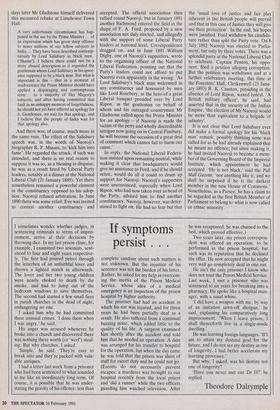If symptoms persist .
I sometimes wonder whether judges, in sentencing criminals to terms of impris- onment, arrive at their decisions by throwing dice. In my last prison clinic, for example, I examined two arsonists, sent- enced to four and eight years respective- ly. The first had poured petrol through the letterbox of an unfaithful lover and thrown a lighted match in afterwards. The lover and her two young children were nearly choked to death by the smoke, and had to jump out of the bedroom windows to save themselves. The second had started a few small fires in parish churches in the dead of night, endangering no one.
I asked him why he had committed these unusual crimes. 'I done them when I was angry,' he said.
His anger was aroused whenever he broke into a church and discovered there was nothing there worth (or 'wed') steal- ing. But why churches, I asked.
'Simple,' he said. 'They're easy to break into and they're packed with valu- able antiques.'
I had a letter last week from a prisoner who had been sentenced to what sounded to me like an inordinately long term. Of course, it is possible that he was under- stating the gravity of his offence: less than complete candour about such matters is not unknown. But the injustice of his sentence was not the burden of his letter. Rather, he asked for my help in overcom- ing the inertia of the Prison Medical Service, whose idea of a medical emergency is an inspection of the prison hospital by higher authority.
The prisoner had had an accident in which his ear was injured, and for three years he had been partially deaf as a result. He also suffered from a continual buzzing noise, which added little to the quality of his life. A surgeon examined him shortly after the accident and told him that he needed an operation. A date was arranged for his transfer to hospital for the operation, but when the day came he was told that the prison was short of staff for escort duty and he could not go. (Escorts do not necessarily prevent escapes: a murderer was brought to our hospital recently from the local prison and 'did a runner' while the two officers guarding him watched television. After he was recaptured, he was chained to the bed, which proved effective.) Two years later, my prison correspon- dent was offered an operation, to be performed in the prison hospital, but such was its reputation that he declined the offer. He now accepted that he might very well go completely deaf in one ear.
He isn't the only prisoner I know who does not trust the Prison Medical Service. Last week, I met a prisoner who was sentenced to six years for breaking into a pharmacy. He spoke like a hospital man- ager, with a nasal whine.
'I did have a weapon with me, by way of an imitation sawn-off shotgun,' he said, explaining his comparatively long imprisonment. 'When I leave prison, I shall thenceforth live in a single-mode dwelling.'
He was learning foreign languages. 'If I am to attain my destinal goal for the future, and I do not see my destiny as one of longevity, I had better accelerate my learning processes.'
But why, I asked, was his destiny not one of longevity?
'Have you never met our Dr H?' he replied.
Theodore Dalrymple


















































 Previous page
Previous page